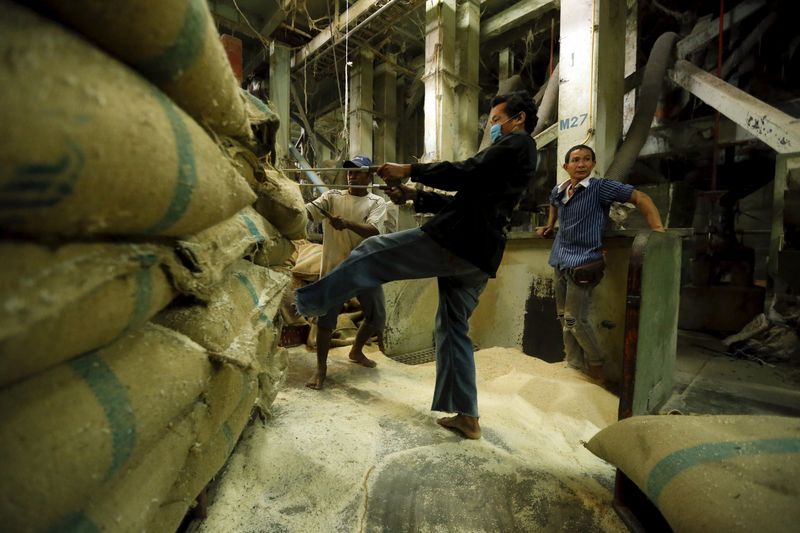Investing
Philippines curbs rice prices as inflation worry mounts

© Reuters. FILE PHOTO: A worker carries on his head a sack of rice inside a government rice warehouse National Food Authority in Quezon city, Metro Manila in Philippines, August 9, 2018. Picture taken August 9, 2018. REUTERS/Erik De Castro/File Photo
By Neil Jerome Morales and Enrico Dela Cruz
MANILA (Reuters) – The Philippines announced price ceilings for rice on Friday to protect consumers, as the rising cost of the national staple probably caused August inflation to accelerate for the first time in seven months.
One of the world’s biggest rice importers, the Southeast Asian nation is cracking down on domestic price manipulation at a time of rising pressure from events such as the Russia-Ukraine conflict, India’s export ban, and unpredictable oil prices.
President Ferdinand Marcos Jr. has approved a maximum price of 41 pesos ($0.72) a kg for regular-milled rice, below the 42 pesos to 55 pesos that prevailed on Wednesday in markets in and around the capital, Manila.
The maximum price for well-milled rice was set at 45 pesos a kg, below the range of 47 pesos to 56 pesos offered by retailers based on government data.
The ceilings will stay until Marcos lifts them, his office said in a statement.
Despite a steady supply of rice, authorities have reported a “widespread practice of alleged illegal price manipulation, such as hoarding by opportunistic traders and collusion among industry cartels in light of the lean season,” it added.
A farmers’ group welcomed the move.
“There is no reason for any price increase these past weeks as there is no rice shortage in the country,” the group, SINAG, said in a statement.
Philippine rice inflation hit 4.2% in July, the highest since 2019.
The central bank expects headline inflation in August to settle within a range of 4.8% to 5.6%, accelerating after hitting a 16-month low of 4.7% in July, partly due to spikes in rice prices.
Philippine inflation has remained well above the bank’s target range of 2% to 4%, keeping it on its toes even as it held the policy rate steady for three straight policy meetings, after a series of hikes totalling 425 basis points.
“Monetary policy has little ability to control food inflation, but the Bangko Sentral ng Pilipinas may need to act if second-round effects become prominent and inflation expectations are de-anchored,” ANZ economists said in an Aug. 25 note, using the official name of the central bank.
Read the full article here

-

 Side Hustles4 days ago
Side Hustles4 days agoWhy the Best CEOs Think Like Anthropologists
-

 Make Money5 days ago
Make Money5 days agoEarn More in 2025: Top 10 High-Yield Savings Accounts Revealed
-

 Side Hustles7 days ago
Side Hustles7 days agoLA Rental Prices Skyrocketing Despite Price Gouging Laws
-

 Side Hustles7 days ago
Side Hustles7 days agoHow to Craft Marketing Campaigns That Reach Multiple Generations
-

 Side Hustles5 days ago
Side Hustles5 days agoWhat to Do If TikTok is Banned — How to Protect Your Brand
-

 Passive Income5 days ago
Passive Income5 days agoHow Pets Can Promote Better Health and Well-Being in the Workplace
-

 Side Hustles5 days ago
Side Hustles5 days ago10 Roles That Are Surprisingly Well-Suited for Outsourcing
-

 Side Hustles6 days ago
Side Hustles6 days agoMeta Is Laying Off 5% of Its Workforce: Read the Memo


















